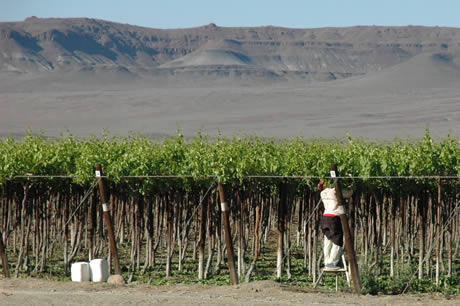Namibia: Grape farmers panic over EPA delay

The Namibian | 20 June 2013
Namibia: Grape farmers panic over EPA delay
By Luqman Cloete
GRAPE farmers at Aussenkehr in the Karas Region have expressed concern over the inconclusive European Union (EU) economic partnership agreement negotiations for Namibia.
The farmers warned that if the EPA is not signed, the grape industry would “die a sudden death,” as they will not be able to compete against zero-rated tax status producers such as Chile, South Africa and Peru, and would subsequently lose the EU market to them.
“There are no alternative market opportunities to compensate for that,” the farmers added.
In their position paper on the EPA, a copy of which The Namibian has seen, which was presented at the national consultation meeting on the EPA negotiations, the farmers reminded those who are against accepting the EPA to take full responsibility for the loss of jobs as well as lack of economic development.
In the absence of an EPA, the farmers say they will be forced pay customs tariffs of between N$10 and N$12 to export one 4,5 kg grape carton.
Revealing that a four-year survey conducted among 45% of the Orange Grape Valley farmers confirmed an average return on investment of between N$7,09 and N$8,80 per carton, the farmers foresee an average loss of 28% if calculations are done against the potential export tax burden.
“The private sector will not be able to invest under such conditions,” the farmers argued.
Saying there is no short to mid term market alternative to EU markets, the farmers accused those claiming that there are market alternatives in the United States or in China of not being familiar with the respective trade.
They explained the bulk of the grape produce equivalent to 89,83% is exported the EU markets compared to African countries (5,3%), Russia (2,3%), Far East (1,47%) and Middle East (1,1%).
The farmers added that both the US and Far East markets are not accessible to Namibian grape farmers.
“Strict SPS regulations are prohibitive for Namibian grape products. There are long-standing bilateral negotiations on this issue with US, and there is no indication that they will succeed in the near future,” the farmers said.
The farmers said Namibia exported 25 966 tonnes of grape cartons at an estimate custom value of N$313 million with a free on-board value after final sales to customer at the range of N$500 million.
The latter values could double with plans to expand the grape production, the farmers added.
According to the farmers, the Aussenkehr grape production presently employs approximately 3 000 permanent and 4 500 seasonal workers.
The farmers described Aussenkehr grape production as a “Super Tipeeg” for Karas Region, adding that it currently provides a livelihood for 45 000 people.
In April, Minister of Trade and Industry, Calle Schlettwein called on Namibia’s “friends in Europe not to abandon us and to work with us towards a lasting solution”.
Schlettwein said this in reaction to a vote by the International Trade Committee of the European Union Parliament to recommend a deadline of 1 October 2014 to the EU Parliament concerning preferential access into the EU market by ACP countries. The deadline applies to ACP countries that have not yet signed Economic Partnership Agreements (EPA) with the EU. The committee voted to set 21 March as the deadline.
Namibia is in the process of negotiating such agreement with the EU as part of the Southern Africa Customs Union and together with Angola and Mozambique forming the Southern African Development Community EPA negotiating configuration.
The EU had initially set a deadline of December 2007 for concluding the EPA, which resulted in the so-called interim EPA.
“These hurriedly concluded negotiations were a failure, as only a limited number of countries signed the interim EPAs,” Schlettwein said at that time.
The deadline would have dire consequences for Namibian producers because it was not within Namibia’s power alone to conclude the negotiations as the country was doing it as part of an economic bloc under the legal obligations of the SACU treaty.





